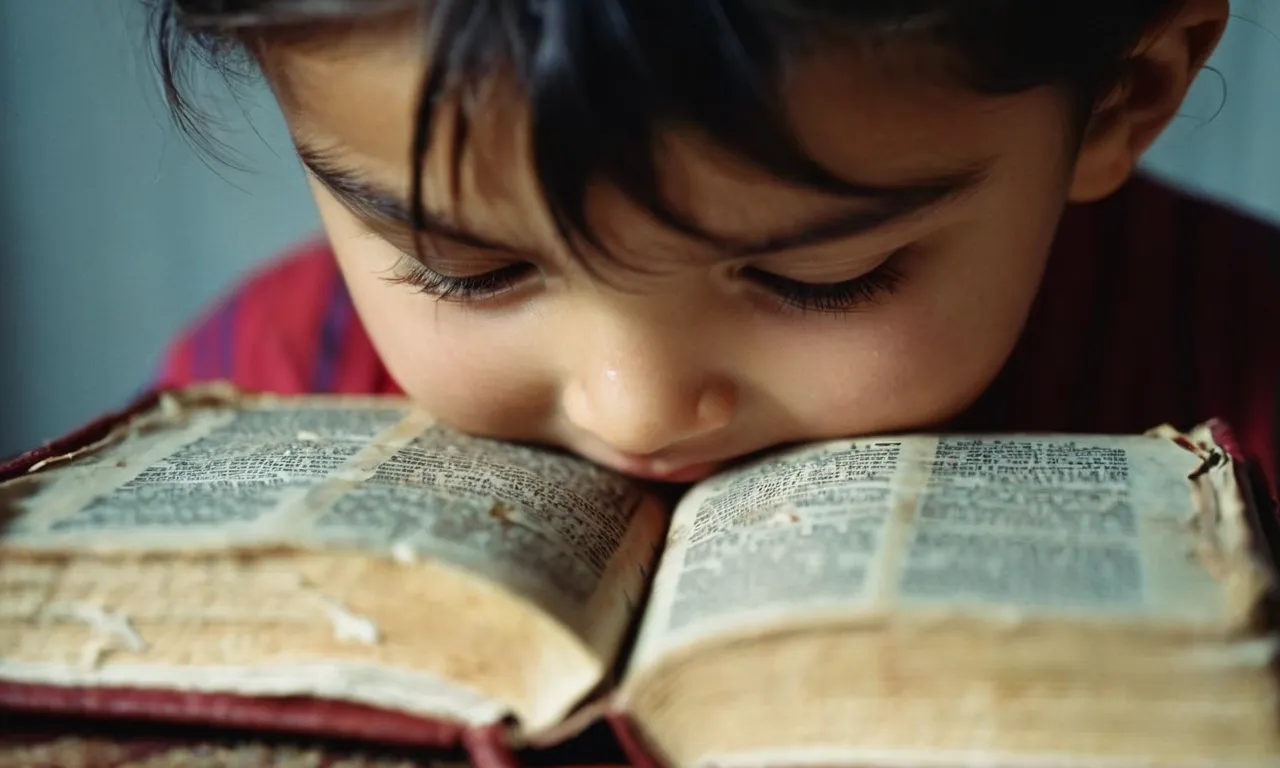What Does The Bible Say About Bad Parents?
Parenting can be extremely difficult, even for well-meaning parents. We all make mistakes in raising our children. However, the Bible has strong words for parents who chronically neglect or abuse their children.
If you feel you may be a ‘bad parent,’ this article explores what Scripture teaches about destructive parenting patterns and how to break negative cycles.
Biblical Examples of Bad Parents
Eli and His Sons
In the book of 1 Samuel, we read about Eli, the high priest, and his two sons Hophni and Phinehas. Eli’s sons were wicked and abused their priestly office by stealing offerings and sleeping with women who served at the entrance of the Tent of Meeting (1 Samuel 2:12-17, 22).
Despite their detestable sins, Eli failed to restrain his sons. God harshly judged Eli for honoring his sons more than God by allowing them to continue in their evil ways (1 Samuel 2:29-30). As a result, both of Eli’s sons were killed on the same day for their irreverent behavior (1 Samuel 4:11).
Eli is a biblical example of a father who refused to discipline his children and tolerated their grievous sins. As a priest and judge, he had the responsibility to turn his sons from their wrongdoing, but he neglected proper parental discipline.
We can learn important principles from Eli’s poor parenting: Parents must require respect and obedience from their children, especially regarding spiritual matters. Proverbs 22:6 says, “Train up a child in the way he should go, and when he is old he will not depart from it.” Though it may be difficult, fathers must be willing to discipline their children instead of passively allowing them to continue in sin.
According to Hebrews 12:6, “the Lord disciplines the one he loves.” Similarly, good parents will lovingly discipline their children.
David and Absalom
Another example of poor parenting is seen in King David’s relationship with his son Absalom. Though David was considered a man after God’s own heart, he failed miserably with his son Absalom. David was essentially an absentee father during Absalom’s childhood.
When his son later rebelled against him and tried to steal his throne, David chose to flee instead of promptly dealing with the situation (2 Samuel 15:14).
David’s poor parenting contributed to Absalom’s rebellion and willingness to try overthrowing his father’s kingdom. Children need attention, affection, and involved parenting in their developmental years.
David was distracted by his many wives and military battles instead of investing in his children. His neglect and unwillingness to discipline Absalom allowed resentment and ambition to build in his son’s heart.
Though most parents will not have to deal with treason in their families, we can learn from David’s mistakes: Make time for children and deal with conflicts promptly instead of avoiding them. The Bible warns, “A child left to himself brings shame to his mother” (Proverbs 29:15).
Children need loving guidance and discipline from involved parents to mature into responsible adults.
Scriptures Warning Against Harming Children
Jesus’ Teachings on Hurting Children
Jesus Christ had strong words of warning for those who would harm children. In the Gospels, Jesus emphasizes God’s care and concern for children multiple times. For example, in Matthew 18:1-6, Jesus says that those who cause children to stumble would be better off drowned in the sea.
He sternly warns adults against looking down on or belittling children, saying that children’s angels in heaven have direct access to God the Father. Jesus also rebukes his disciples for trying to keep children away from him, saying, “Let the little children come to me, and do not hinder them, for the kingdom of heaven belongs to such as these” (Matthew 19:14).
Clearly, Jesus took violations against children extremely seriously.
Another example is Mark 9:36-37, where Jesus takes a child into his arms and teaches that welcoming children is equivalent to welcoming him. This shows how highly Jesus valued children. And in Luke 17:2, Jesus warns that it would be better for someone to have a millstone hung around their neck and be drowned than to cause a child to stumble.
Jesus had strong words for those who would harm or lead children astray physically, spiritually, or emotionally. His teachings emphasized God’s heart for the vulnerable and repeatedly warned adults against violating children’s wellbeing in any way.
Old Testament Laws Protecting Children
In the Old Testament, God instituted laws meant to protect children from harm. For example, Exodus 21:15-17 prescribes the death penalty for anyone who attacks or curses their father or mother. God was serious about maintaining the authority of parents and the structure of the family.
Deuteronomy 21:18-21 details a process for dealing with persistently rebellious children, showing that parents were to take responsibility for correcting their children’s behavior. And Leviticus 18 prohibits child sacrifice, sorcery, adultery, and sexual immorality – all sins that would deeply hurt children in that cultural context.
God called his people to purity and justice in order to prevent vulnerable members of society from being abused or led astray.
In addition, God’s commands to Israel included multiple provisions to care for orphaned and impoverished children who lacked the normal protection of parents. For instance, Deuteronomy 14:28-29 and 16:9-14 establish tithes for the vulnerable.
Isaiah 1:17 exhorts God’s people to “seek justice” and “defend the orphan.” God called all of society, not just biological parents, to ensure that kids were treated fairly and provided for. The Old Testament makes it abundantly clear that harming or oppressing children brought severe judgment, while caring for and protecting children brought blessing.
Overcoming Generational Cycles of Bad Parenting
Confessing and Repenting from Past Wrongs
Breaking generational cycles of bad parenting often starts with honest self-reflection and repentance. As the Bible says in 1 John 1:9, “If we confess our sins, he is faithful and just to forgive us our sins and to cleanse us from all unrighteousness.”
Taking personal responsibility for past parenting mistakes, rather than blaming others, is an important first step. This involves humbly admitting faults and failures to God, asking for forgiveness, and determining to walk in a new direction (Luke 13:3).
For example, if you struggled with anger and yelled at your kids frequently, confess this and ask the Lord to change your heart and behavior going forward. The same applies if you were overly permissive and failed to discipline your children.
Admitting your wrongs clears the slate for positive change.
In addition to confession before God, it can be helpful to confess past parenting mistakes to your children, as appropriate. This models godly humility and accountability. According to research by the American Psychological Association, children whose parents admitted wrongdoing showed less anxiety, aggression, and rule-breaking behavior compared to those whose parents did not apologize.
Seeking Help and Accountability
Once past wrongs are confessed, Christian parents can move forward in new patterns of relating to their kids. However, change rarely happens alone. Seeking help through biblical counselors, mentors, pastors, parenting classes, or support groups is vital for overcoming generational cycles.
For instance, if you lacked emotional availability and struggled to connect with your children due to your own upbringing, make practical efforts to improve. Set aside regular one-on-one time to talk and listen without distractions. Learn to be more affirming and encouraging.
Join a parenting small group for support and growth.
In addition, inviting accountability from other godly parents can promote progress. According to Proverbs 27:17, “As iron sharpens iron, so one person sharpens another.” Ask a spiritually mature friend to regularly check in on how you’re relating to your kids.
Be humble enough to receive their loving feedback.
Parenting help is abundantly available through biblical resources too. Excellent Christian books on parenting include Shepherding a Child’s Heart by Tedd Tripp and Grace Based Parenting by Tim Kimmel. Such resources provide practical, scriptural guidance for nurturing kids in godly ways.
While generational cycles can be hard to overcome, God’s enabling grace offers hope. As Ezekiel 36:26 promises, He gives us a “new heart” and puts a “new spirit” within us. By confessing and repenting of past failures, seeking help, and walking in humility and accountability, Christian parents can break free from destructive patterns and leave a positive legacy for generations to come.
Learning Positive Parenting Principles
Unconditional Love
The Bible encourages parents to love their children unconditionally, just as God loves us unconditionally (1 John 4:10-11). This means embracing children with open arms, regardless of their actions or attitudes.
It involves showing grace, mercy and forgiveness when they fail or make mistakes (Luke 15:11-32). Unconditional love provides children with a safe environment to grow and develop their identity in Christ.
Showing unconditional love can be challenging for parents. But relying on God’s strength and wisdom, through prayer and reading Scripture, gives us the compassion we need (Philippians 4:13). Additionally, Christian counseling or parenting classes at church can provide helpful strategies.
Gentle Discipline
The Bible tells parents to lovingly discipline their children, steering them away from foolishness and toward wisdom (Proverbs 22:15). But it warns against harshness, urging fathers not to exasperate or embitter their children (Ephesians 6:4).
Research shows that gentle discipline focused on teaching good behavior is more effective long-term than punishment alone.
Gentle disciplinary tactics include using time-outs, assigning reasonable consequences, giving age-appropriate choices, and setting clear rules and expectations. While firm at times, the overriding motive is to lovingly shepherd the child’s heart (Hebrews 12:7-11).
This builds trust and models God’s gracious authority rather than hostility or control.
Modeling Godly Character
More than anything else, children need good examples to emulate (Proverbs 20:7). The Bible reminds parents that kids learn attitudes, speech and behaviors by observing those around them. Therefore, moms and dads carry the responsibility of modeling godliness in everything from integrity in work and finances to purity in relationships (Philippians 4:8-9).
Leading by example also means apologizing when parents mess up. Rather than pretense, this displays humility and sets the tone for children to take responsibility for their own mistakes. Ultimately, parents must look to Jesus as their moral compass (Hebrews 12:2) and pray for wisdom in practicing faith within everyday family life (James 1:5).
Conclusion
While the Bible offers correction for harmful parenting, God also provides grace and solutions for change. If you recognize a need to improve as a mother or father, take hope! Small changes today can help ensure your children experience the nurturing love all children deserve.
With God’s strength, you can break negative cycles and parent in a way that honors Christ.








